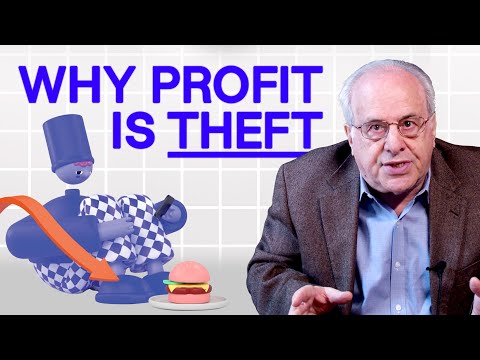Every time a Gravel Institute video drops an Angel gets it's wings.
-7DeadlyFetishes
Seriously. I'm glad these kids are doing something and not just doing nothing.
I liked the style of the previous Wolff video better, but I agree the production is excellent
Tbh I wish he had addressed the “WhAt aBoUt tHe rIsK ThAt tHe oWnEr tAkEs?” counter-take. Actually, does anyone have a nice, concise ELI5 on how to respond to it?
The only risk the owner takes is going into debt (like all workers are in) and having to pay back the debt by getting a job where they are exploited by a more successful capitalist.
Basically the risk is becoming a worker.
So here's a pretty snide way to do it: ask "what risk?"
If a worker starts a business, and it is successful, they are now a business owner
If a worker starts a business and it is unsuccessful, they return to being a worker.
Of course this overlooks debt and such, and perhaps the person's retirement gets fucked over, but their every-day-life upon failure is basically materially identical to if they had never tried at all
1 : In purely economic terms, risk is a cost, not a reward. Companies spend money to minimize risk.
2 : Morality is not the basis of our economic system. You can't have your cake and eat it too. You can't say "greed is good" and "self-interest is supreme" and then be like "it is immoral for workers to be greedy and pursue their self-interest".
3 : Economic planning, even under capitalism, is far more efficient when workers are rewarded the full possible amount of the profit share. The artificially low price of labor discourages labor-saving innovation and reduces economic growth and prosperity.
4 : In the modern age, there is almost a total disconnect between owners and managers of large busines. The people who actually take decisions involving risk are different from the people who own capital. It is only in small businesses where owners take risks.
5 : There is no way to calculate the economic value of risk-taking. It is not an objective quantity.
6 : Morality is a form of false conciousness like religion. Morals don't exist in the real world any more than ghosts or fairies. They are not material object nor do they refer to any real social relations between people. We don't base any of our actions on morality. We don't avoid killing or stealing because of metaphysical moral imperatives, but material things like "we go to jail for killing" or "we get negative emotions in our brain for stealing". Saying someone "deserves" something is a moral argument. We don't say workers "deserve" the full value of their labor, we simply encourage them to exercise their self-interest.
“Risk” in and of itself doesn’t promise a reward. Workers take risks commuting to their jobs. Depending on the job, the work itself is a risk to the workers safety and well-being. By working for a wage, workers are risking that their boss won’t cut their job or ship it overseas.
From the perspective of the owner, taking a risk in and of itself doesn’t deserve a reward. The “reward” that some business owners receive for their risk is the profits their business makes. And profit is nothing more than stolen wages.
They have another video by Wolff about capitalism not actually reducing poverty, which is also good
Big Wolff fan but doesn't this get something a bit wrong?
It seems to imply that wages are paid from the profit the capitalist makes; the workers are just not getting the amount they produce and that surplus is the capitalist profit.
Iirc Marx explains that wages are actually paid for at the start of the process in the same way raw materials are bought. The capitalist then makes their profit and invest it back into wages and materials which perpetuates the process.
It's probably helpful to think of it in terms of inflow (revenues) and outflow (expenses). Where exactly in the process expenses are paid and revenues are received doesn't materially matter very much in the course of normal operation. Profit is simply what's left from revenue after expenses are paid for a given period, which, yes, is used to accumulate further productive capital and inputs.
I guess I would agree that it doesn't really matter for the scope of this short video but Marx does make a big deal about it in Value, Price, and Profit. Labor is a commodity purchased to begin like raw materials. This is a very important prerequisite to understanding how supply and demand effect the cost of labor and how the price of any commodity (which labor is) always will trend toward the cost of it's production. Which in the case of labor is the cost of the bare minimum of food, water, shelter for human workers to maintain themselves.
Edit: actually it might be in Wage, Labour, and Capital not Value, Price and Profit I can't remember sorry 😅
Maybe so. I guess what I'm saying is kinda a nitpick relative to the scope of what this videos is trying to accomplish




